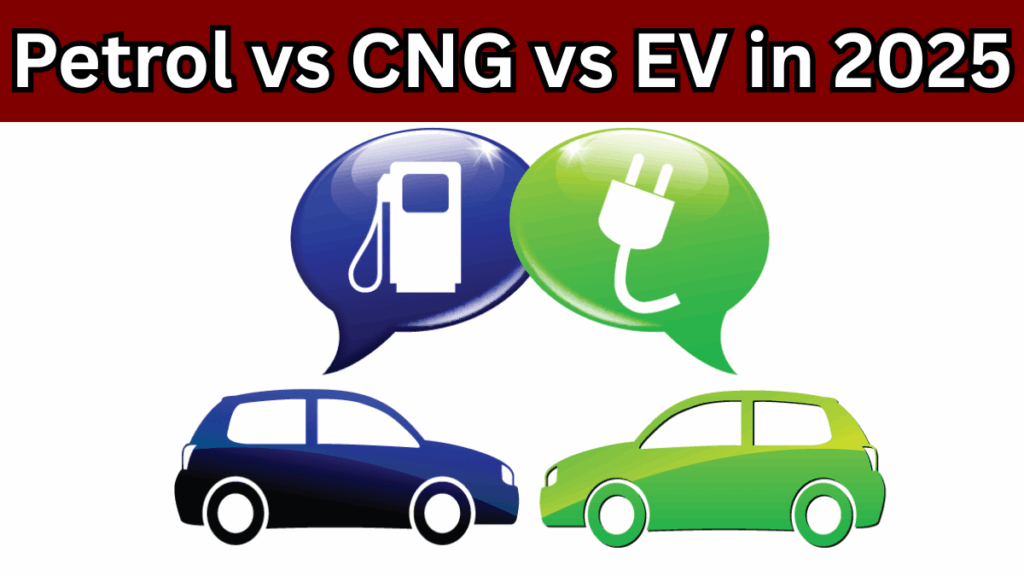Choosing the right fuel type for your vehicle can be a tricky decision, especially in 2025 when more options like Electric Vehicles (EVs) are gaining momentum. Whether you’re driven by cost, environmental concerns, or convenience, understanding Petrol vs CNG vs EV 2025 is essential to make a smart choice. Let’s break down the costs and benefits of each, especially focusing on the fuel price comparison India and how EV running cost stacks up against traditional fuels.

Table of Contents
Why the Choice Matters in 2025?
Fuel prices fluctuate, and technology keeps advancing. In India, the rising awareness around pollution and affordability has made people rethink their options. The big question is: Which is more economical and practical—Petrol, CNG, or EV?
Fuel Price Comparison India: The Basics
Here’s a quick glance at the average fuel prices (approximate values for 2025):
Fuel Type |
Average Price (per litre/kg/kWh) |
Key Cost Factor |
|---|---|---|
Petrol |
₹110 per litre |
High price, wide availability |
CNG |
₹65 per kg |
Lower price, limited stations |
EV |
₹7 per kWh (charging cost) |
Low running cost, variable electricity rates |
Petrol vs CNG vs EV 2025 — Running Costs Explained
Understanding the EV running cost compared to petrol and CNG is crucial because it determines your monthly budget and total expenses over time.
Petrol
-
Petrol engines are the most common.
-
Fuel price remains volatile, influenced by global oil prices and taxes.
-
Higher fuel cost means higher monthly spending on fuel.
-
Maintenance cost is moderate but includes oil changes, filters, and engine servicing.
CNG
-
CNG (Compressed Natural Gas) offers significant savings at the pump.
-
Infrastructure is still developing, so refueling can be challenging outside cities.
-
Lower emissions than petrol, making it environmentally friendlier.
-
Maintenance costs are slightly higher due to specialized engine components.
EV (Electric Vehicles)
-
EVs have the lowest running cost per kilometer.
-
Charging infrastructure is expanding rapidly.
-
Maintenance is cheaper due to fewer moving parts and no engine oil.
-
Initial vehicle price is higher but offset by fuel savings and government incentives.
Side-by-Side Cost Comparison (Per 100 km)
Fuel Type |
Fuel/Energy Cost |
Maintenance Cost |
Total Cost (Approx) |
|---|---|---|---|
Petrol |
₹800 |
₹150 |
₹950 |
CNG |
₹480 |
₹180 |
₹660 |
EV |
₹250 |
₹80 |
₹330 |
Note: These values are estimates based on average consumption and prices in India.
What’s Better for You? Factors to Consider
-
Daily Commute & Distance: EVs shine if you drive mostly within the city due to easy home charging and lower cost per km.
-
Fuel Availability: Petrol is everywhere, CNG stations are fewer, and EV charging points are growing.
-
Budget: If upfront cost is an issue, petrol or CNG cars are cheaper initially.
-
Environment: EVs produce zero tailpipe emissions, a big plus for reducing pollution.
-
Government Incentives: Subsidies and tax breaks for EVs can reduce costs significantly.
Final Verdict: Petrol vs CNG vs EV 2025
While petrol still dominates due to convenience and availability, CNG offers an affordable and cleaner alternative for many urban users. EVs, though initially expensive, promise the lowest running cost and are ideal for those prioritizing sustainability and long-term savings.
FAQs
1. Is EV cheaper to run than petrol and CNG in India?
Yes. Due to lower electricity costs and minimal maintenance, the EV running cost per kilometer is significantly lower than petrol and CNG.
2. How reliable is CNG infrastructure across India?
CNG stations are mostly concentrated in major cities, so availability can be limited in rural areas. It’s best suited for city commuters.
3. What should I consider when comparing Petrol vs CNG vs EV 2025?
Consider fuel availability, initial vehicle cost, daily driving distance, environmental impact, and government incentives.
4. Will fuel prices affect my choice between Petrol, CNG, and EV?
Absolutely. The fuel price comparison India is a crucial factor because rising petrol prices push consumers towards CNG and EVs, which offer better savings over time.
Click here to learn more
